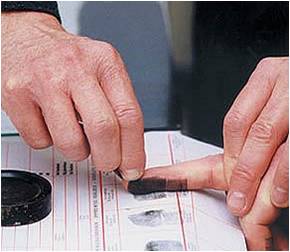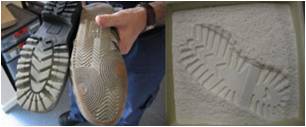| ||||||||||||||||||||||||||||||||||||||||||||||||||||||||||||||||||||||||||||||||||||||||||
|
|
| |||||||||||||||||||||||||||||||||||||||||||||||||||||||||||||||||||||||||||||||||||||||||
|
Unit 7 Investigation of crime
UNIT 7
Investigation of crime
Investigation means a search. It means a search for the truth, for the offender, for witnesses, who help to reconstruct the happening and will present evidence of it in courts. Criminal investigation is indispensable to learn whether an accident involves a crime and, if so, who is responsible. As for the police work the investigation is an inquiry into the facts surrounding the commission of the criminal offence, i.e. what it is, where it was, who the offender was, when, why and how he was committing the crime. No successful investigation is available without participation of a highly professional policeman, who possesses such attributes of the policeman’s profession as dedication, courage, intelligence, competency, self-command, specialized investigative aptitudes and a professional instinct, i.e. some sleuthing powers. To ferret out serious crimes and detect those who commit them a police officer should do his best in performing his job. He should be knowledgeable not only in theoretical fundamentals of law enforcement, but he should also be skilled in such policeman’s functions as marksmanship, driving a patrol car, laying an ambush, communication with the public. All that helps him in maintaining proper police-public relations and in his decision-making judgement. Thus, frustrating the efforts of professional criminals and quick and accurate solution of crimes depends very much on proper special training, education and selection of the police officers. It also depends on their skills in undercover work – conducting surveillance, penetrating the underworld, work with the informants, their choosing, cultivating and usage. The informant is a person who gives the police officer confidential information about a crime as his civic responsibility and duty. A police officer operating in plain clothes often comes to know personally the offenders of the specific criminal specialty, their friends, their relatives and close associates, and becomes familiar with salient features of their modus operandi. In case the investigative officer works at the crime scene he defines the crime quickly and examines the scene carefully before he touches and disturbs anything. He takes active measures to detect the offender, i.e. to identify, locate and apprehend the suspect or criminal. He usually takes pictures of the scene and its objects and makes a plan on which he records the position of any trace. He collects and protects evidence, interviews witnesses and details a number of other factors, for example, search of the premises and persons for discovery of stolen property and instruments of the crime. Then he examines all the evidence to establish evidence of guilt against a person responsible for a crime. No doubt quick and accurate crime investigation and solution, catching, arresting and bringing the criminal to justice is essential. At the same time a very much more important and difficult thing is crime prevention. In order to function effectively in crime prevention the professional policeman establishes contacts with the public and maintains positive attitudes about the citizens he serves. If understanding is lacking, then decision-making judgement and general performance of the policeman in the field will be less effective. The better he understands the people he deals with, the better he manages to perform his duty.
А Task 1. Give the English for: сыскные способности; умение правильно принять решение; характерная черта; внедряться в преступный мир; сообщник; проводить негласный надзор; способ действия преступников; место преступления; обыскивать помещения; умение метко стрелять; краеугольный камень; обнаруживать украденное имущество; фотографировать; самообладание; расследование; способность; преданность; устраивать засаду; знакомиться; негласная работа; узнавать.
Task 2. Match English and Russian equivalents:
Task 3. Complete the sentences: 1) Criminal investigation is … 2) A highly professional policeman should possess… 3) To ferret out of serious crime a police officer should… 4) Quick and accurate solution of crimes depends on … 5) The informant is a person … 6) A police officer operating in plain clothes often … 7) When the investigating officer works at the crime scene … 8) In order to function effectively in crime prevention the professional policeman …
Task 4. Agree or disagree: 1) In case the investigating officer works at the crime scene he only defines the crime. 2) Criminal investigation is not an important factor of the police service. 3) Criminal investigation is an inquiry into the facts surrounding the commission of the criminal offence. 4) In order to function effectively in crime prevention a professional policeman should be knowledgeable only in theoretical fundamentals of law enforcement. 5) The investigating officer takes active measures to detect the offender that is to identify, locate and apprehend him. 6) The informant is a person who works at the crime scene together with the police officer. 7) The investigating officer usually takes pictures of the crime scene and makes a plan. 8) A police officer operating in uniform often comes to know personally the offenders, their relatives and close associates.
Task 5. Answer the questions:
B
Task 1. Make the summary and annotation of the text: What is a Crime?
Crimes can be thought of as acts, which the state considers to be wrong and which can be punished by the state. There are some acts, which are crimes in one country but not in another. For example, it is a crime to drink alcohol in
Task 2. Make the summary and annotation of the text: Collecting Evidence
The identification of the suspect is not the final stage of the process: it is essential that the investigating agency gathers sufficient legally admissible evidence to convince the judge or jury that the suspect is guilty. In order to secure the necessary evidence, the ро1|се employ а variety of powers and procedures; because these potentially involve interference with the freedom of the suspect, who must at this stage be treated as an innocent person, they are normally subject to close control either by legislation or by the courts. One important procedure is а search of the suspect or of premises or vehicles. Most jurisdictions allow а search to be carried out only if there is "reasonable ground for suspecting" that the evidence will be found. In some cases а person may be stopped on the street and searched. In this instance, the police officer is to identify himself and state the reasons for the search. А search of private premises usually requires а search warrant issued by а magistrate or judge. The law generally permits а search warrant to be issued only if the issuing authority is satisfied after hearing evidence on oath that there is good reason to suspect that the evidence will be found on the premises. The warrant may be subject to time limits and normally permits only one search to be carried out. Evidence discovered as а result of any search that does not comply with the procedures laid down by the law is not admitted in the trial, even though it clearly establishes the guilt of the accused person, and even though the suppression of the evidence may prevent the conviction of а person who is plainly guilty.
Task 3. Read and translate the text: Criminal Responsibility
Criminal responsibility is not limited only to those who perform the criminal acts themselves. As а general principle, anyone who "aids and abets" perpetrator by encouraging or in any way knowingly helping him (for instance, by providing information, implements, or practical help) is an accomplice and is considered equally guilty. Those who actually perform the criminal act (е. g., wielding the weapon that strikes the fatal blow) are called principals in the first degree; those who assist at the time of the commission of the offence (е. g., holding the victim down while the principal in the first degree strikes the blow) are principals in the second degree; and those who assist before the crime takes place (е. g., by lending the weapon or by providing information) are accessories before the fact. As а general rule, all are equally responsible in the eyes of the law and liable to the same punishment. In many cases the accessory before the fact will be considered more culpable — if, for instance, he has instigated the offence and arranged for it to be committed. In some cases the person who actually performs the act that causes the crime is completely innocent of evil intent — for instance, the nurse who administers to а patient, on the doctor’s instructions, what she believes to be medicine but what is in fact poison. In this situation the person who carries out the fact is an innocent agent and is not criminally responsible; the person who causes the innocent agent to act is the principal in the first degree. The accessory after the fact is one who helps а felon to evade arrest or conviction, by, for example, hiding him or destroying evidence.
C Investigation of Crime
| ||||||||||||||||||||||||||||||||||||||||||||||||||||||||||||||||||||||||||||||||||||||||||
|
| ||||||||||||||||||||||||||||||||||||||||||||||||||||||||||||||||||||||||||||||||||||||||||
| © Академия Министерства внутренних дел Республики Беларусь Электронный учебно-методический комплекс | ||||||||||||||||||||||||||||||||||||||||||||||||||||||||||||||||||||||||||||||||||||||||||
 Criminal investigation is the keystone of the police service.
Criminal investigation is the keystone of the police service. 